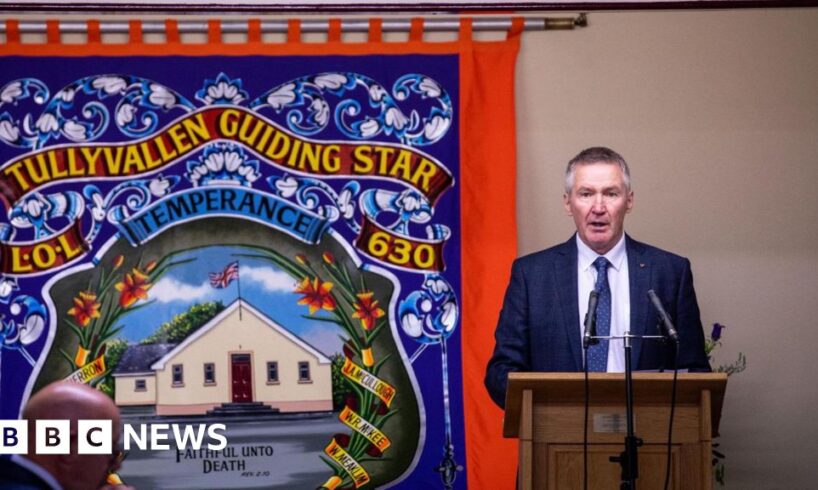
Mark SimpsonCommunity correspondent, BBC News NI
BBC
Alasdair Cooke tries to ensure that what happened to his grandfather is not forgotten
Fifty years after his grandfather was shot dead, Alasdair Cooke regularly sits in the wooden chair in which he was killed.
It was on a Monday night in September 1975 that James McKee died in a hail of IRA bullets as he chaired an Orange Order lodge meeting at Tullyvallen in County Armagh.
Now it is his grandson who sits in the same wooden seat, as the most senior officer in the lodge.
As he does so, Alasdair tries to ensure that what happened to his grandfather – and the four other Orangemen fatally wounded that night – is not forgotten.
IRA attack
The IRA tried to wipe out the entire lodge with guns and explosives but it survived.
Alasdair said: “During these 50 years, our lodge has continued to thrive and be an integral part of this community.
“We still meet in this hall and at each meeting we gather round the lodge table – the same table our murdered brethren sat at. It bears the physical scars of an event some cannot still fully comprehend.”
The Tullyvallen massacre, as it became known, was one of many atrocities during the three decades of violence in Northern Ireland known as the Troubles.
This month’s 50th anniversary of the horrific attack in a quiet corner of south Armagh has been marked with a number of memorial events.
As the most senior person in the lodge, the worshipful master, Alasdair has led tributes to the men who were murdered.
They included his uncle, as well as his grandfather.
The victims
The men killed in the attack in September 1975 were the lodge secretary Nevin McConnell, 48, the lodge chaplain John Johnston, 80, William Herron, 68, and also father and son James, 73, and Ronnie McKee, 40.
Seven others were badly injured.
Four of the survivors of the attack – Berry Reaney, John Henry, Sam Ross and Rowland Cooke – were at a recent religious service marking the 50th anniversary.
It was on a Monday night in September 1975 that James McKee died in a hail of IRA bullets
It was at the lodge’s monthly meeting on 1 September 1975 that two IRA gunmen burst into the hall and shot at everyone they could see.
There are still bullet holes in the table inside the hall.
Another gunman was outside and fired at those trying to escape.
The gang left a bomb outside as they made their getaway. It was later defused by the army.
The IRA used weapons which were also fired four months later in the Kingsmills murders, when 10 Protestant workmen were shot dead by a gang that ambushed their minibus in south Armagh.
Other attacks
Courtesy of the Linen Hall Library
The attack was branded a “blood bath” by local media
Two weeks before the attack on the hall at Tullyvallen, a member of the Orange lodge, William Meaklim, was murdered in the area.
Five months after the attack on the hall, another lodge member, Joseph McCullough, was murdered close to the hall.
In total, seven members from the lodge were killed in a short period of time. The men are all remembered in memorial stone in Tullyvallen hall, which is situated in the countryside near Newtownhamilton.
For Alasdair Cooke, the 50th anniversary of the mass-murder is poignant. He was 15 years old at the time, just about to return to school after the summer holidays.
His brother, uncle and grandfather were among the 17 Orangemen at the meeting which was attacked.
Only one of his three relatives survived.
Aftermath
PA Media
Five people were killed during the attack at Tullyvallen
Alasdair remembers the aftermath of the killings.
“Winter was looming and the long dark evenings were very scary,” he recalled.
“Years passed and everyone was left to continue within their own family grouping – with no external support – and nobody will ever appreciate how families managed to cope with a trauma which has never been far from thoughts.”
A number of people were involved in the IRA attack on the Orange hall, but only one has been convicted – the driver of the getaway vehicle.
A new framework for addressing the legacy of the Troubles was announced earlier this month.
Presbyterian Minister, the Reverend Nigel Reid, spoke at the recent memorial service marking the 50th anniversary of the Tullyvallen attack.
He said: “Society must never forget the innocent victims and survivors of terrorist attacks, and seek to pray and support them in every way possible.”
Much has changed in the five decades since the murders at Tullyvallen, but the wooden furniture remains in the hall, and so do the painful memories.





